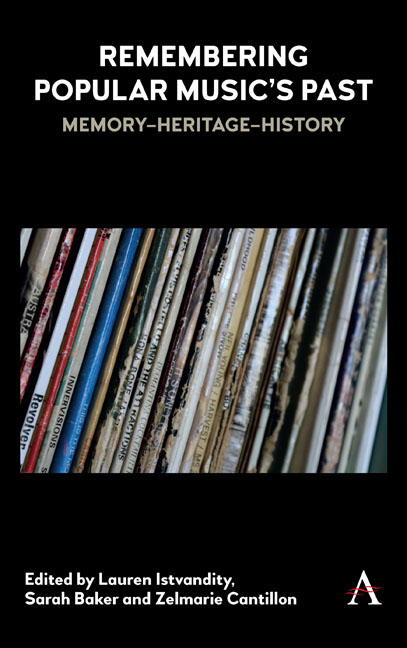Book contents
- Frontmatter
- Contents
- List of Figures
- Acknowledgements
- Chapter 1 The Precarity of Memory, Heritage and History in Remembering Popular Music's Past
- Part I MEMORY
- Part II HERITAGE
- Chapter 7 Mark II: Reworking the Heritage B(r)and
- Chapter 8 The Continually Precarious State of the Musical Object
- Chapter 9 Showing Off: Taking Popular Music Research into the Museum
- Chapter 10 Preserving Icelandic Popular Music Heritage: Issues of Collection, Access and Representation
- Chapter 11 Questioning the Future of Popular Music Heritage in the Age of Platform Capitalism
- Part III HISTORY
- List of Contributors
- Index
Chapter 10 - Preserving Icelandic Popular Music Heritage: Issues of Collection, Access and Representation
from Part II - HERITAGE
Published online by Cambridge University Press: 09 July 2019
- Frontmatter
- Contents
- List of Figures
- Acknowledgements
- Chapter 1 The Precarity of Memory, Heritage and History in Remembering Popular Music's Past
- Part I MEMORY
- Part II HERITAGE
- Chapter 7 Mark II: Reworking the Heritage B(r)and
- Chapter 8 The Continually Precarious State of the Musical Object
- Chapter 9 Showing Off: Taking Popular Music Research into the Museum
- Chapter 10 Preserving Icelandic Popular Music Heritage: Issues of Collection, Access and Representation
- Chapter 11 Questioning the Future of Popular Music Heritage in the Age of Platform Capitalism
- Part III HISTORY
- List of Contributors
- Index
Summary
Introduction
For a small country with a population of approximately 350,000 people, Iceland releases a prodigious volume of popular music, and has borne artists who have come to be known globally, such as Björk, Sigur Rós and Of Monsters and Men. As Prior notes (2015, 81), over the last 30 years ‘Iceland's reputation has been increasingly tied to the prominence of its music’. In this same period, Iceland has also seen the heritagization of its popular music history through the production of music documentaries such as Rokk i Reykjavík (1982), Popp i Reykjavík (1998), Screaming Masterpiece (2005), Electronica Reykjavík (2008) and Tónlist: Icelandic Music Documentary (2014); the release of books like Blue Eyed Pop: The History of Popular Music in Iceland (2013); reissues of classic albums from the SENA label; and travelling exhibitions including Lobster or Fame (2003), which celebrates two decades of the Bad Taste label. In addition, museums devoted to the preservation and display of popular music have opened, including Rokkheimur Rúnars Júlíussonar (trans. Rock World of Rúnars Júlíusson, est. 2009), Pönksafn Íslands (trans. Icelandic Punk Museum, est. 2016), Rokksafni. (trans. Icelandic Museum of Rock ‘n’ Roll, est. 2014) and Tónlistarsafn Íslands (trans. Icelandic Music History Museum, est. 2009). Several national institutions also collect artefacts related to popular music, including Ríkisútvarpi. (trans. Icelandic National Broadcasting Service) and Landsbókasafn Íslands –Háskólabókasafn (trans. National and University Library of Iceland). Popular music has arguably ‘played a fundamental role in producing and mediating senses of Icelandic identity and locale for both Icelanders and non-Icelanders alike’ (Cannady 2014, 145). The institutions and heritage products mentioned above reflect and reinforce, in material form, versions of what it means to be Icelandic –a national identity, ‘shaped in the struggle for independence’ from Denmark (Gudmundsson 1993, 53), and productively synthesized ‘as early as 1950’ (Mitchell 2013, 51) as Icelandic musicians combined ‘American popular music and the cultural heritage of Iceland by making records in which Icelandic pop-singers sang Icelandic lyrics to American rock-hits’ (Gudmundsson 1993, 53).
- Type
- Chapter
- Information
- Remembering Popular Music's PastMemory-Heritage-History, pp. 131 - 144Publisher: Anthem PressPrint publication year: 2019



